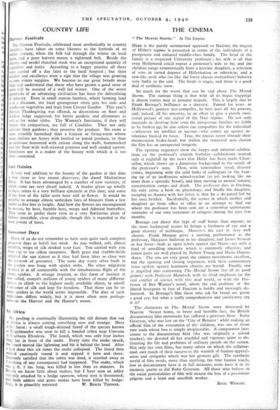THE CINEMA
The Mortal Storm." At The Empire.
HERE is the purely sentimental approach to Nazism; the impact of Hitler's regime is presented in terms of the individuals of a
prosperous and cultured middle-class family. The head of the
family is a respected University professor ; his wife is all that even Hollywood could expect a professor's wife to be; and the children range symmetrically from a heroine daughter, a selection of sons in varied degrees of Hitlerisation or otherwise, and a sow-like cook who (so like the lower classes everywhere) behaves very badly in the end. The finale is tragic, and there is a good deal of synthetic snow.
So much for the worst that can be said about The Mortal Storm. The curious thing is that with all its bogus trappings
it almost comes near to genuine tragedy. This is largely due to Frank Borzage's brilliance as a director. Famed for years as Hollywood's greatest tear-compeller, he here uses all his powers,
and, indeed, all his sincenty, in an effort to give a purely emo- tional picture of one aspect of the Nazi regime. He not only succeeds in showing how even the prosperous families are liable to be broken up; he also enlists our sympathies for the individual —whatever his intellect or income—who comes up against in- tolerance backed by force. True, the masses never obtrude their inconvenient hydra-head; but within the restricted area chosen the film has an unexpected integrity.
The opening sequences show the happy and informal celebra- tions en the professor's sixtieth birthday—celebrations marred only at nightfall by the news that Hitler has been made Chan- cellor, which shows up a dangerous background in the minds of the professor's sons. Then, with remorseless tread, disaster comes, beginning with the cold looks of colleagues or the beat- ing up of an inoffensive school-teacher (as yet looking like no more than a sporadic brawl), and then moving to mental torture, concentration camps and death. The professor dies in Dachau, his only crime a book on physiology; and finally his daughter, escaping to Austria with her lover, is shot by a ski-patrol led by her own brother. Incidentally, the scenes in which mother and daughter go from office to office in an attempt to find out where the professor has been sent are a somewhat unfortunate reminder of our own treatment of refugees during the past few months.
Barrage can direct this type of stuff better than anyone; to the most hackneyed scenes he brings a freshness of eye and a great mastery of technique. Morcovn the cast is very well chosen. Frank Morgan gives a moving performance as the professor; Margaret Sullavan as his daughter, and James Stewart as her lover—both as open rebels against the Nazis—act with a kind of unwilling intensity which is extremely effective; and minor parts are well played by Robert Young and Maria Oupen- skaya. The sets are very good, the camera movements excellent, but the opening and closing sequences, with their commentary voice spoken against inanimate objects, are horrid. Finally, one is impelled into contrasting The Mortal Storm (for all its good points) with Professor Mamlock, with its vivid emphases on the real conflict of science with this mad world, or with the Pro- fessor of Rex Warner's novel, where the real problem of the liberal bourgeois in face of Fascism is boldly and movingly de- lineated. In Borzage's film those who ask for bread are given a good cry; but what a really comprehensive and satisfactory cry it is!
The characters in The Mortal Storm were destroyed by Nazism. Nearer home, in brute and horrible fact, the British documentary film movement has suffered a grievous blow. Ruby Grierson, who was lost on the ' City of &flares ' while making an official film of the evacuation of the children, was one of those rare souls whose loss is simply irreplaceable. A comparative late- comer to the documentary field (she was originally a school teacher), she devoted all her youthful and vigorous spirit to de- lineating the life and problems of ordinary people on the screen. Not only her own films, but many others on which she collabor- ated, owe much of their success to the warmth of human appreci- ation and sympathy which was her greatest gift. The synthetic world of film needs, more than anything, the true human touch; few in documentary have it in full measure; none have it in its intrinsic purity as did Ruby Grierson. All those who believe in the social potentialities of film will mourn the loss of a passionate pilgrim and a loyal and unselfish worker.
BASIL WRIGHT.


























 Previous page
Previous page